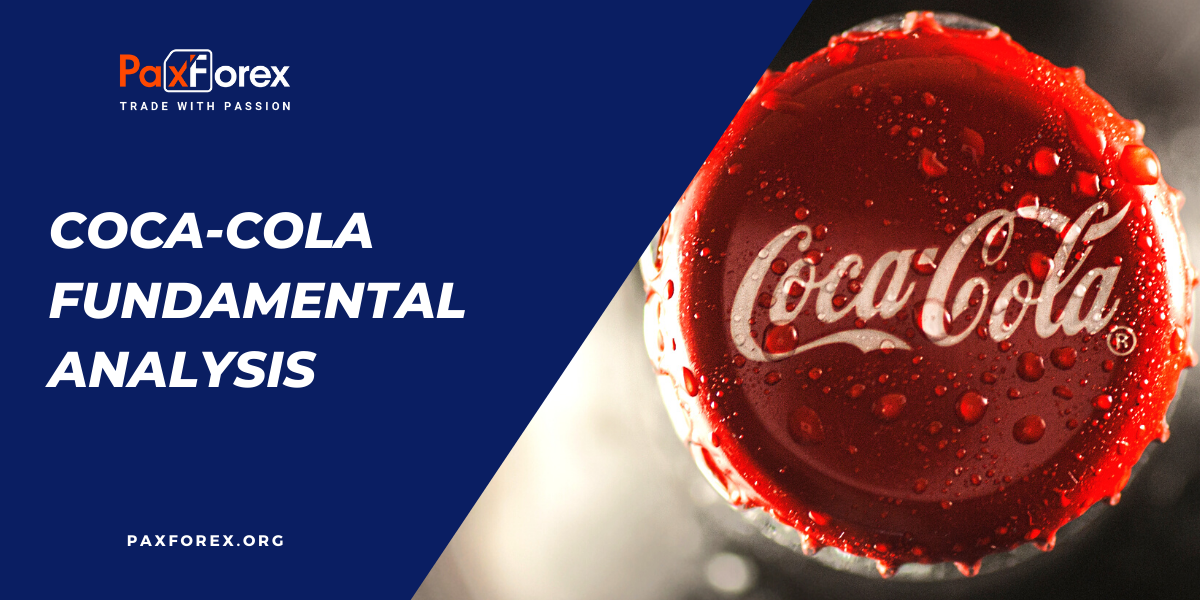
Source: PaxForex Premium Analytics Portal, Fundamental Insight
Coca-Cola stands as one of the enduring pillars of dividend stocks in today's market landscape. With its iconic product, an impressive history of consistently increasing dividends spanning decades, and a yield that surpasses the average, it continues to captivate investors seeking income opportunities.
Nevertheless, the stagnant growth in free cash flow and the escalating cost of maintaining these payouts may give rise to concerns among investors. This leads to the fundamental question of whether this dividend remains a valuable proposition for prospective shareholders.
Regardless of one's perspective on Coca-Cola as a potential investment, there's no denying the remarkable resilience of its dividend track record. The company initiated its dividend payments in 1920, shortly after its stock was introduced to the market. In 1963, it embarked on a streak of annual dividend increases, a tradition that endures to this day.
This unbroken streak has undoubtedly piqued the interest of income-oriented investors, including the likes of Warren Buffett's Berkshire Hathaway. Despite Buffett's relatively late entry into Coca-Cola stock in 1988, his initial $1.3 billion investment has evolved into a substantial source of income, generating $736 million in annual dividend income—an impressive 57% yearly return that continues to rise.
New investors, while not likely to match such substantial returns, can still benefit from Coca-Cola's dividend. With an annual payout of $1.84 per share, they can expect a respectable 3% dividend yield, which is approximately double the current average cash return of around 1.5% seen in the S&P 500. For those seeking a dependable source of growing income, a dividend supported by the global presence of a beloved soft drink brand remains an attractive proposition.
However, despite the enticing high yield, investors are finding increasingly compelling reasons to exercise caution. It's not just due to the fact that some certificates of deposit (CDs) can secure returns exceeding 5%. Coca-Cola has delivered a slightly negative total return over the past year and has lagged behind the performance of the S&P 500 over a five-year period. Such lackluster performance sheds light on why Warren Buffett's team hasn't expanded its Coca-Cola holdings since 1994.
Furthermore, the escalating cost of the dividend should raise significant concern. In the first two quarters of 2023, Coca-Cola generated $4 billion in free cash flow. Yet, the dividend payout consumed nearly $2.1 billion in the first quarter alone, suggesting that it failed to fully cover this expenditure.
Management's response was to push back the latest dividend payment date to early in the third quarter, a practice it had resorted to in previous years. This move possibly indicates that the dividend cost has become a burden on the company.
Thankfully, Coca-Cola anticipates generating $9.5 billion in free cash flow for the year, which should suffice to cover the expected $8.4 billion in dividend costs. Nevertheless, this leaves just over $1 billion available for share repurchases or reinvestment in its core operations.
Moreover, abandoning a 61-year streak of dividend increases would likely erode confidence in the stock, making such a scenario improbable. Consequently, one must assume that dividend costs will continue to rise.
The latest increase in this year's dividend raised it by 4.5%. If the company's challenges persist, Coca-Cola may need to slow down the rate of dividend increases. However, if free cash flow fails to keep pace with the growing dividend, it will place added strain on the company.
Given the current circumstances, investors should not be drawn to the stock solely for its dividend. Although the cessation of dividend hikes still seems unlikely, Coca-Cola's total return has trailed behind market indexes. Additionally, with the ability to earn a higher return on CDs while taking on less risk, the allure of Coca-Cola's dividend has dimmed.
It's worth noting that long-time investors like Warren Buffett have enjoyed substantial capital gains from their Coca-Cola investments, and the attractive dividend yield gives them no reason to divest. However, considering Buffett's prolonged abstention from adding more shares in nearly three decades, both potential investors and existing shareholders would be wise to heed his example and adopt a cautious stance for the time being.
Provided that the currency pair is below 61.00, follow the recommendations below:
- Time frame: D1
- Recommendation: short position
- Entry point: 59.20
- Take Profit 1: 58.00
- Take Profit 2: 56.00
Alternative scenario:
In case level 61.00 is broken-out, follow the recommendations below:
- Time frame: D1
- Recommendation: long position
- Entry point: 61.00
- Take Profit 1: 62.00
- Take Profit 2: 63.00













